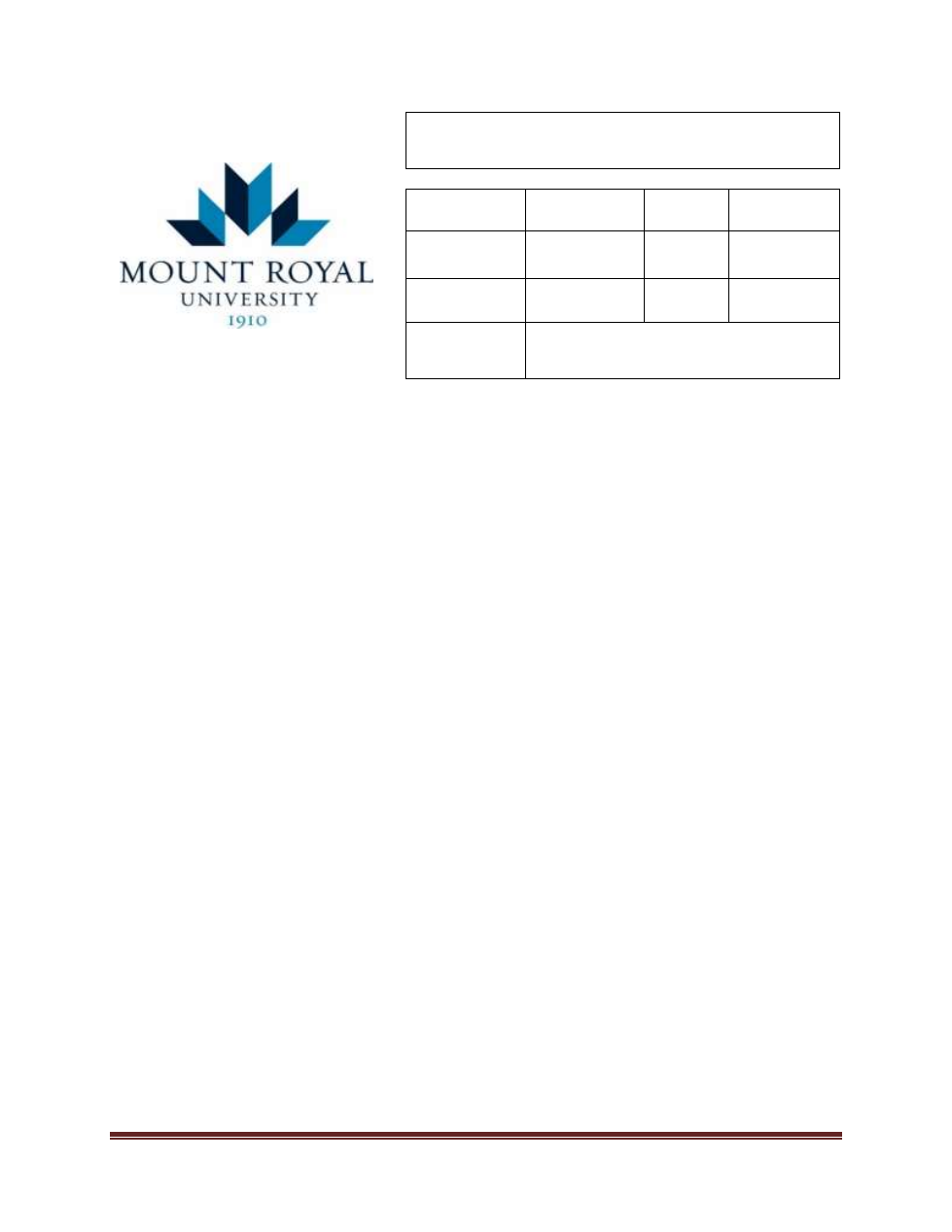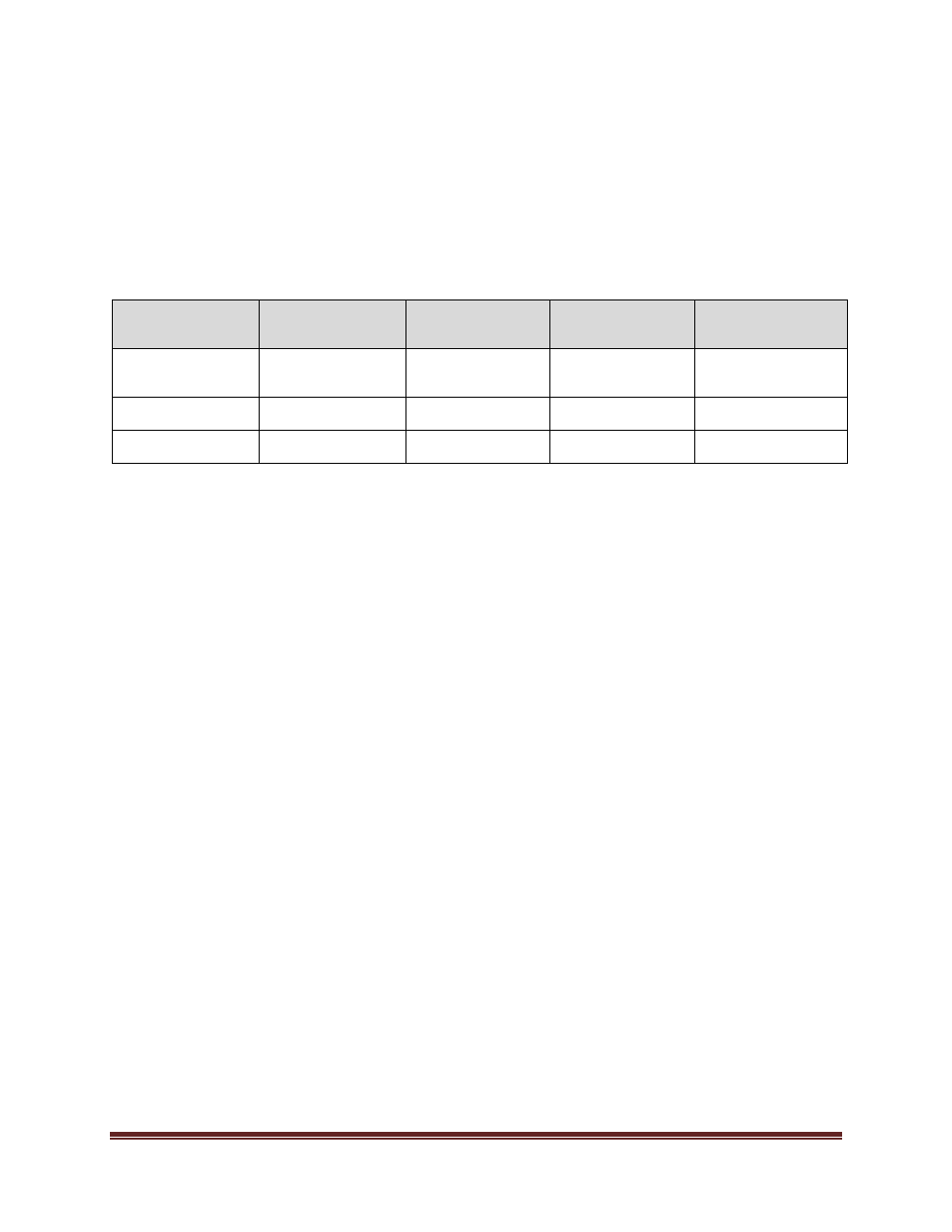
Protected Disclosure (“Whistleblower”) Policy – October 14, 2020
Page 1 of 6
PROTECTED DISCLOSURE
(“WHISTLEBLOWER”)
POLICY
Policy Type:
Management
Initially
Approved:
February 10,
2014
Policy Sponsor:
General Counsel
and University
Secretary
Last
Revised:
April 1, 2021
Primary Contact:
General Counsel
and University
Secretary
Review
Scheduled:
October 14,
2025
Approver:
Board of Governors
A.
OVERVIEW
Mount Royal University is committed to the highest standards of honesty, conduct and integrity in
all its activities. The University requires all Employees to act honestly and with integrity and to
safeguard the public resources for which they are responsible.
B.
PURPOSE
The purpose of this Policy is to:
• demonstrate the University's compliance with the Public Interest Disclosure (Whistleblower
Protection) Act, SA, 2012, cP-39 and regulations;
• clearly state the University's position with respect to significant and serious matters in
relation to the University that an Employee believes may be unlawful, dangerous to
individuals or injurious to the public interest, including Wrongdoings and Wrongdoings
committed for the benefit of the University;
• ensure reporting mechanisms are convenient, secure, and accessible to Employees;
• ensure protection to those who report suspected Wrongdoing; and
• outline consequences for Wrongdoings.
C.
SCOPE
This Policy applies to Employees who make Protected Disclosures covered under the Act.
This Policy does not replace other University policies and procedures that allow Employees to
report allegations, nor does it alter any responsibilities prescribed under existing policies. If the
Designated Officer determines that an allegation does not meet the definition of Wrongdoing within
this Policy, the Employee will be referred in writing to an appropriate university process to address
the allegation.
Allegations made through other policies may become a Protected Disclosure and will be addressed
under this Policy if an Employee chooses to file a Protected Disclosure and the Designated Officer
determines the allegation meets the definition of Wrongdoing within this Policy.

Protected Disclosure (“Whistleblower”) Policy – October 14, 2020
Page 2 of 6
D.
POLICY STATEMENT
1.
GENERAL
1.1
Employees have an obligation to conduct University-related activities ethically and
in accordance with
the University’s applicable collective agreements, terms and
conditions of employment and University policies and procedures.
1.2
Wrongdoing, including Wrongdoing that benefits the University, is strictly forbidden
and will not be tolerated. Employees who commit a Wrongdoing will be subject to
disciplinary action, up to and including termination, and, if appropriate, criminal
prosecution or civil action.
1.3
The Chief Officer
will ensure that the University’s framework for addressing
Protected Disclosures follows all applicable legislation, is appropriately
communicated to the University community, and may delegate to a Designated
Officer the responsibility for managing and investigating Protected Disclosures under
this Policy and related procedures. If no designation is made, the Chief Officer is
considered the Designated Officer for the purposes of this Policy and related
procedures.
1.4
Any Employee who believes that a Wrongdoing has been or is being committed is
expected to make a Protected Disclosure in accordance with the Procedure for
Filing a Protected Disclosure.
1.5
All Protected Disclosures that the Designated Officer determines fall within the scope
of this Policy will be investigated in accordance with the Procedure for
Investigating a Protected Disclosure.
2. ANONYMOUS AND NON-EMPLOYEE CONCERNS
2.1
An Employee may make an allegation of Wrongdoing anonymously through
Confidence Line; however, they should be aware that doing so limits the ability of the
University to respond and investigate. An Employee who wishes to remain
anonymous may also make an allegation of Wrongdoing directly to the
Commissioner.
2.2
If the Designated Officer receives an allegation of Wrongdoing that has been made
anonymously or by an individual who is not an Employee, the Designated Officer
may, as the Designated Officer considers appropriate, and subject to the Act and its
regulations:
a. investigate and report the allegation of Wrongdoing in the same manner as a
Protected Disclosure;
b. while maintaining the anonymity of the individual, forward the allegation to the
appropriate area for further evaluation; or
c. conclude that no investigation is warranted.
3.
REPRISAL

Protected Disclosure (“Whistleblower”) Policy – October 14, 2020
Page 3 of 6
3.1
An Employee who has sought advice on making a Protected Disclosure or who has
made a Protected Disclosure in good faith is protected from Reprisal of any kind.
Any Employee who has cooperated in an investigation or who has declined to
participate in a Wrongdoing is also protected from Reprisal of any kind.
3.2
If an Employee believes they have experienced a Reprisal, or an attempt at Reprisal,
of any kind, they may file a complaint directly to the Commissioner. The University
does not have jurisdiction to address allegations of Reprisals because of a Protected
Disclosure.
3.3
Any Employee whose actions constitute a Reprisal, or an attempt at Reprisal, of any
kind against an Employee who has made a Protected Disclosure will be subject to
disciplinary action up to and including termination of employment.
4.
CONFIDENTIALITY
4.1
The identity of an Employee who makes a Protected Disclosure, the Employee
alleged to have committed Wrongdoing, and any witnesses who participate in
investigations, may only be revealed:
a. to the Designated Officer;
b. to the Chief Officer;
c. to the Commissioner;
d. to individuals engaged by the Designated Officer to assist with managing or
conducting an investigation;
e. to other persons when required by law;
f.
when disclosing the identity of the Discloser is absolutely necessary to ensure
the right to procedural fairness and natural justice is respected.
4.2
The Designated Officer will inform the Employee who made the Protected
Disclosure, the Employee alleged to have committed wrongdoing, or witnesses who
participated in the investigation of the intent to reveal their identity prior to doing so.
In the event of a dispute regarding the release of the identity of anyone relating to a
Protected Disclosure, the Designated Officer will seek advice from the
Commissioner.
4.3
All Employees involved in any process related to this Policy are required to maintain
confidentiality. An Employee who has purposely breached the confidentiality of any
aspect of a Protected Disclosure may be subject to disciplinary action up to and
including termination of employment.
5.
RECORDS
5.1
The Designated Officer is the sole custodian of records created from the filing or
investigation of a Protected Disclosure and will manage those records in accordance
with the University’s Records Retention Schedule and all applicable privacy
legislation.

Protected Disclosure (“Whistleblower”) Policy – October 14, 2020
Page 4 of 6
5.2
Individuals making requests for information do not have a right of access under the
Freedom of Information and Protection of Privacy Act to information that would reveal
the identity of a person who has requested advice about making a Protected
Disclosure, made a Protected Disclosure or whose complaint has been referred to
the Labour Relations Board pursuant to the Act. However, if that information can
reasonably be severed from a record, individuals who make requests under FOIP
have a right of access to the remainder of the record.
6.
ANNUAL REPORTING
6.1
The Chief Officer will provide an annual report to the Board of Governors of Protected
Disclosures. The report must include:
a. the number of reports filed by Employees;
b. the number of reports investigated;
c. the findings of investigations conducted pursuant to a report; and
d. any action taken pursuant to an investigation or if actions were not taken based
on a recommendation, the reasons why no actions were taken.
6.2
The Chief Officer will not identify an Employee who requested advice or made a
Protected Disclosure, any Employee who participated in an investigation, or disclose
individually identifying health information within the annual report.
6.3
A summary of the
report will be included in the University’s annual report.
E.
DEFINITIONS
(1)
the Act:
means
the
Public
Interest
Disclosure
(Whistleblower
Protection) Act (Alberta), as amended, and any regulations
thereunder
(2)
Chief Officer:
means the President and Vice-Chancellor
(3)
Commissioner:
means the Public Interest Commissioner appointed in
accordance with the Act
(4)
Designated Officer:
means the Chief Officer or an individual appointed by the
Chief Officer to manage and report on Protected Disclosures
made in accordance with this Policy and related procedures
(5)
Discloser:
means any Employee who chooses to file a Protected
Disclosure in accordance with the Policy
(6)
Employee:
means individuals who are engaged to work for the University
under an employment contract, including but not limited to
faculty, staff, exempt, casual and management employees
(7)
Policy:
means the Protected Disclosure (“Whistleblower”) policy

Protected Disclosure (“Whistleblower”) Policy – October 14, 2020
Page 5 of 6
(8)
Protected
Disclosure:
means a written report of Wrongdoing made in good faith by an
Employee in accordance with the Act and this Policy and
related procedures
(9)
Reprisal:
means measures taken or directed against an employee, which
may include dismissal, layoff, suspension, demotion or transfer,
discontinuation or elimination of a job, change of job location,
reduction in wages, change in hours of work, reprimand, or any
other measure that adversely affects the employee's
employment or working conditions, because the employee has,
in good faith, sought advice about making a Disclosure, made
a Disclosure, cooperated in an investigation under the Act,
declined to participate in a Wrongdoing, or done anything in
accordance with the Act.
(10)
University:
means Mount Royal University
(11)
Wrongdoing:
Any activity or conduct engaged in by an Employee in or
relating to the University, as follows:
• engaging in, or counseling or directing someone to
engage in, the following: breaking the law through
contravening an Act or regulation
• any act or omission that creates a substantial and
specific danger to the life, health or safety of individuals
or substantial and specific danger to the environment
• gross mismanagement of public funds, a public asset,
or the delivery of a public service identified in the
regulations
• gross mismanagement of employees through conduct
of a systemic nature that indicates a problem in an
org
anization’s culture relating to bullying, harassment
or intimidation.
• Any other Wrongdoing as defined by the Act or related
regulations.
F.
RELATED POLICIES
• Code of Conduct – Employees policy
• Integrity in Research and Scholarship policy
G.
RELATED LEGISLATION
• Public Interest Disclosure (Whistleblower Protection) Act, SA, 2012, cP-39.
H.
RELATED DOCUMENTS

Protected Disclosure (“Whistleblower”) Policy – October 14, 2020
Page 6 of 6
• Protected Disclosure Form
• MRFA Collective Agreement
• MRSA Collective Agreement
• Terms & Conditions of Employment for Exempt Employees
• Terms & Conditions of Employment for Postdoctoral Employees
• Terms & Conditions of Employment for Research Assistants Employees
I.
REVISION HISTORY
Date
(mm/dd/yyyy)
Description of
Change
Sections
Person who
Entered Revision
(Position Title)
Person who
Authorized Revision
(Position Title)
10/14/2020
Comprehensive
Revision, Title
Change
All Sections
–
including title
change
Board of Governors
04/01/2021
Editorial
Template
Policy Specialist
President and Vice-
Chancellor
01/26/2022
Editorial
Policy Sponsor
Policy Advisor
General Counsel and
University Secretary





